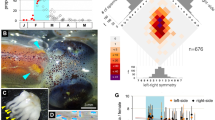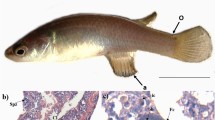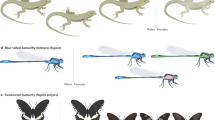Abstract
DURING an investigation of the colours in Pomatoceros triqueter L., we have found that this species is a protandrous hermaphrodite. The duration of the male phase of the sexual cycle is subject to individual variation. Some individuals pass through the male phase in less than one month, and then quickly change into the female phase. We have seen many of these animals spawn eggs one week after their last discharge of sperms. Other individuals remain males for months; but—so far as we have been able to see until now—they, too, finally change into females. We have never seen females change into males.
This is a preview of subscription content, access via your institution
Access options
Subscribe to this journal
Receive 51 print issues and online access
$199.00 per year
only $3.90 per issue
Buy this article
- Purchase on Springer Link
- Instant access to full article PDF
Prices may be subject to local taxes which are calculated during checkout
Similar content being viewed by others
Author information
Authors and Affiliations
Rights and permissions
About this article
Cite this article
FÖYN, B., GJÖEN, I. Sex and Inheritance in the Serpulid Pomatoceros triqueter L.. Nature 165, 652–653 (1950). https://doi.org/10.1038/165652b0
Issue Date:
DOI: https://doi.org/10.1038/165652b0
Comments
By submitting a comment you agree to abide by our Terms and Community Guidelines. If you find something abusive or that does not comply with our terms or guidelines please flag it as inappropriate.



